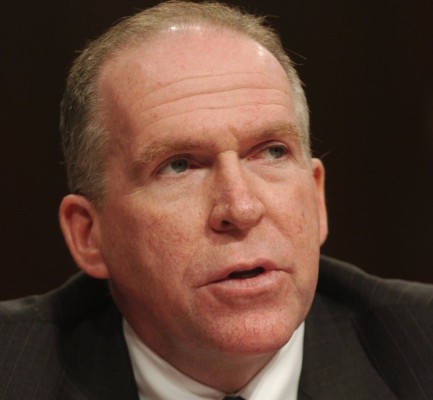John Brennan Named Distinguished Fellow for Global Security
KRT
John Brennan, Former Director of the CIA, will join Fordham Law School as the Distinguished Fellow for Global Security for the Center on National Security. (PHOTO COURTESY of George Bridges/KRT via TNS)
September 5, 2017
Former director of the Central Intelligence Agency (CIA) John Brennan, Fordham College at Rose Hill (FCRH) ’77, has been appointed as the Distinguished Fellow for Global Security at Fordham Law School’s Center on National Security.
In an email to the Fordham community sent on the night of Sept. 4, University Provost Stephen Freedman said that Brennan “will contribute his expertise and insights as a leading practitioner in national security, foreign policy, governance, and the rule of law.” In his role as a Distinguished Fellow, he will participate in conferences, workshops and other events hosted by the Center on National Security, and will “also serve as a mentor to students who wish to know more about government service and professional opportunities in the field of national security.”
Most recently, Brennan served as the director of the CIA under President Barack Obama. Prior to holding that position, he served as Deputy National Security Advisor, Assistant to the President for Homeland Security and Counterterrorism and founding Director of the National Counterterrorism Center. He has a total of 33 years of government service.
Brennan Received an honorary degree from Fordham in 2012, and was the university’s commencement speaker that year.
While at the Center on National Security, Brennan is planning on focusing on solutions to “some of the country’s foreign policy quandaries, including the North Korea crisis,” according to the New York Times.
While Brennan will be the first person at the Center to hold his title, previous fellows include terrorism expert Peter Bergen, New Yorker writer Lawrence Wright, and former Pentagon official Michael Sheehan, according to the Times.
In addition to receiving a degree in political science when he graduated in 1977, Brennan received an honorary degree from Fordham in 2012, and was the University’s Commencement speaker that year. He also received the Fordham University Club of Washington, D.C.’s Brien McMahon Award for Distinguished Public Service from University President Rev. Joseph M. McShane, S.J., in 2014. In 2016, he visited Fordham Law’s Presidential Succession Clinic, where he spoke about the presidential succession system.
Some of those honorary measures, however, were met by backlash from the Fordham community due to Brennan’s and the CIA’s stances on torture at the time. When the university announced Brennan as the commencement speaker and a recipient of an honorary degree in 2012, students such as Sogand Afkari, Fordham College at Lincoln Center (FCLC) ’12, called for a petition against the speaker.
“The reason we started the petition was that this commencement speaker is a perpetuation of Fordham’s culture of silence,” Afkari said at the time. “They’re disregarding his professional history. He is allegedly linked to Bush-era CIA torture and prisoner abuse.”
Brennan’s stance on controversial interrogation techniques had previously come under criticism in 2008, when he initially withdrew his name from consideration for a top intelligence position in the Obama administration due to the controversy.
Brennan was again the target of criticism from the Fordham community in February 2015, when faculty petitioned for Brennan’s honorary degree to be rescinded due to his controversial involvement and stances on torture and interrogation techniques.
Motivated by the findings detailed in the Senate Select Committee on Intelligence’s report on the CIA’s use of detention and interrogation policies, seven faculty members formed an ad-hoc committee called Fordham Faculty Against Torture (FFAT).
“This award was problematic at the time. In light of the recently released senate intelligence committee report on cia torture, it is now indefensible.”
“In May 2012, despite the objections of both faculty and students, Fordham University awarded an honorary degree to John Brennan, then Deputy National Security Advisor, now Director of the CIA,” the petition reads. “This award was problematic at the time. In light of the recently released Senate Intelligence Committee Report on CIA Torture, it is now indefensible. Mr. Brennan is complicit with the war crimes and human rights abuses documented by the Senate.”
The petition eventually garnered 750 signatures. FFAT was comprised of Orlando Rodriquez, Ph.D., professor of sociology and anthropology in the Graduate School of Arts and Sciences; Jeanne Flavin, Ph.D., professor of sociology and anthropology; Jeannine Hill Fletcher, Ph.D., professor of theology; Glenn Hendler, Ph.D., associate professor and chair of English; Bradford Hinze, Ph.D., Rahner chair and professor of theology; James Kim, Ph.D., assistant professor of English; and David Myers, Ph.D., professor of history. The Fordham Observer also published a staff editorial at the time in support of the petition.
The Board of Trustees unanimously rejected the petition in May 2015, after University President Rev. Joseph M. McShane, S.J., presented the petition to them earlier that month.
“While the Board and I condemn torture and extrajudicial imprisonment in the strongest possible terms, as a public servant, Mr. Brennan does not set the policies that have led us to this place, but rather is responsible to the elected officials, including the President, who have,” McShane wrote at the time, according to Bob Howe, assistant vice president for communications and special advisor to the President.
McShane instead stated that President Obama, President George W. Bush and Congress were legally responsible for the policies that “indeed all of us find so shocking.” He further stipulated “Do not for a minute believe that honoring John Brennan is the same as honoring the institution for which he works, nor its checkered history.”
FFAT responded by stating that “John Brennan’s honorary degree will now permanently stain Fordham’s honor and that of the Society of Jesus.” They said that McShane’s comments were “gracious in tone,” but “disappointing in its message and its reasoning.”









